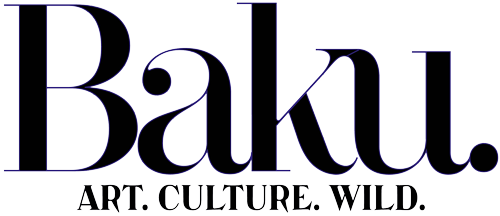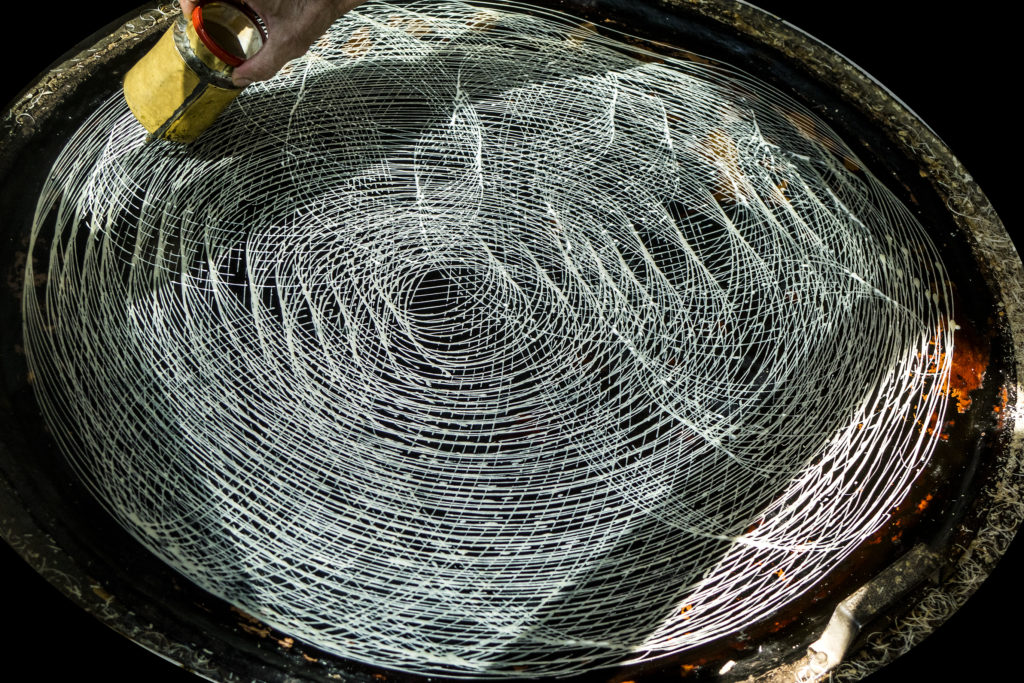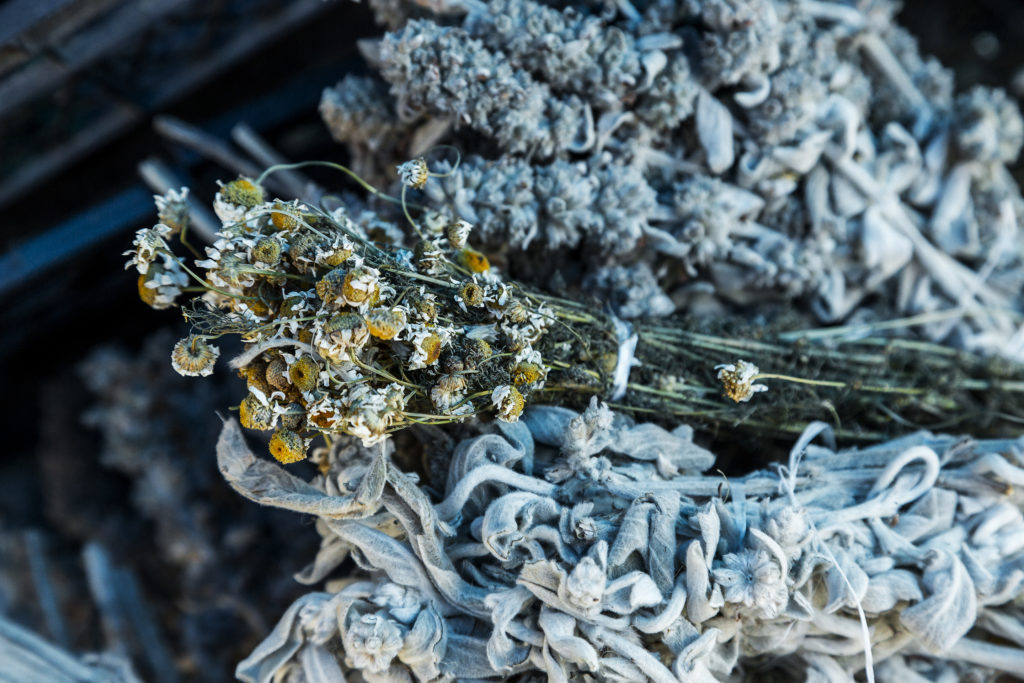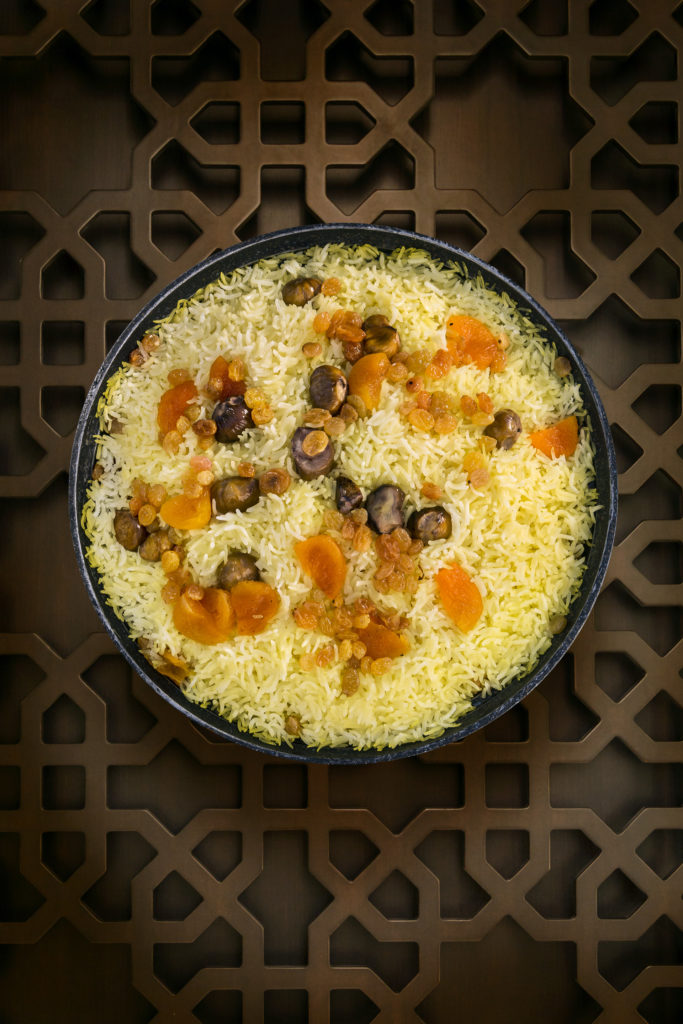Krasnaya Sloboda, in northern Azerbaijan, is a unique survival among the world’s Jewish settlements, and it has a comfort cuisine to match. Caroline Eden takes a trip to the kitchen of Naomi Ruvinova and discovers how this food unites not just people, but cultures
To get to Krasnaya Sloboda, first you must leave the capital’s ordered streets behind and drive north on the main Baku–Quba artery. Once lined with walls and fortresses, controlling trade between Baku and Derbent over the border in the Republic of Dagestan, today this road is fast moving and asphalted.
Next, passing Besbarmaq Dag – the sacred Five Finger Mountain – the silhouettes of the stripy Candy Cane Mountains pan into view. You might then stop for a moment to watch the sun turn the Caspian Sea to glitter on your right, before continuing into the forested interior of northern Azerbaijan. There – after about three hours – you’ll reach the cliff-top town of Quba, hovering high above the Qudiyalcay River.
Krasnaya Sloboda (or Red Town) lies just five minutes away from Quba and at first glance looks much like any other small town in Azerbaijan. Then, on closer inspection, unusual things start to appear: a Star of David squats on top of a zinc-roofed house; a man in a kippah (Jewish skullcap) drives a Lada past a community centre decorated with a huge silver menorah (a candelabrum and symbol of Judaism).
Krasnaya Sloboda is home to Azerbaijan’s remote and little-known Mountain Jews. They are descended from Jews exiled from the Kingdom of Israel in the eighth century BCE. They settled first in what is now the territories of modern Iran but when wars erupted between the Khazars and Arabs they were forced to flee and take shelter in the remote Caucasus Mountains to avoid compulsory conversion, and have remained there ever since. In the 1740s the ruler of Quba, Fatali Khan, gave the local Jewish community permission to live there free from persecution. Today Krasnaya Sloboda is one of the most remote Jewish communities in the world as well as being the largest all – Jewish town outside Israel. It is also probably the world’s last surviving shtetl (pre-Holocaust Jewish village). All this makes Krasnaya Sloboda a unique and fascinating place.
In the heart of the town, the aroma of chestnut and chicken wafts out of the Bet Knesset synagogue in Isaak Xanukov Street. Inside, Naomi Ruvinova is toiling over a hot stove while clothed in leopard print and sequins, with jewelled peep-toe shoes on her tiny feet.
Piles of matza crackers – unleavened bread traditionally eaten during Passover – imported from Israel sit on the table next to Kiddush grape juice, usually drunk at the synagogue on the Sabbath. “Matza are addictive, like sunflower seeds,” Ruvinova says, smiling through two rows of gold teeth and popping another cracker into her mouth. She stirs raisins into a cauldron of plov, glossy with oily rice. Azerbaijan is home to more than 40 different plov recipes, typically heavy with mutton or chicken, but the one Ruvinova prepares is vegetarian, tinted yellow by corn oil and scattered with juicy apricots and chestnuts. It is a dinner-time treat for the community here, she says.
Also on the table are discs of plump round fadi bread decorated with tiny holes, typical of the region. Instead of using a checkish (a bread stamp), Ruvinova makes the dotted patterns by hand using the quill of a chicken feather.
Locals filter in and out, greeting one another with either a “Shalom” or a “Salaam”. Unlike most synagogues around the world, there are no boundaries or locked doors here. On the hallway wall the history of this small community of just over 3,000 people is displayed. Sepia photographs show men in furry Orthodox hats and long coats. Other images depict visiting rabbis from Israel and community leaders shaking hands with former president Heydar Aliyev. A large poster of Jerusalem shines beneath a chandelier.
Back in the kitchen, its cupboards stocked with utensils and several china dinner services, Ruvinova unties her apron and sits. At 66 she has grown-up children living in Israel (somewhere she’s not keen to live: “too dangerous”) and New Jersey (which she quite likes). Called upon to cook at countless Jewish holidays and gatherings, her dishes have made her something of a local celebrity. “I have been on Azerbaijani television. [News channel] Russia-24 also came to film me cooking in my home,” she muses, snapping off another corner of matza. Ruvinova is used to being asked questions, but she likes to make one point especially clear: “When people ask if I am an Ashkenazi or Sephardi Jew, I say neither – I am a Mountain Jew,” she says proudly.
Over hundreds of years, their culinary customs have been maintained and still show traces of their Middle Eastern roots, just as their complex language Judeo-Tat does, based as it is on Farsi with elements of Aramaic, Arabic and Hebrew. Thanks to the isolation of the mountains, the community’s traditions have been preserved. Today Azerbaijan’s Mountain Jews are living testimony to the country’s religious tolerance. A lesson, perhaps, to the rest of the world.
Photography by Richard Haughton
Styling by Tom Wolfe
Producer Maria Webster
Special thanks to the residents and administration of Krasnaya Sloboda
A version of this story appeared in the Winter 2014/2015 issue of Baku magazine.








